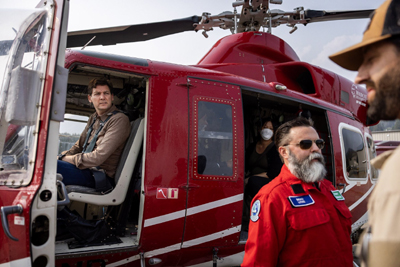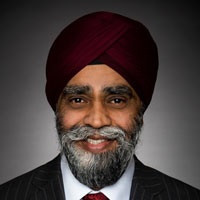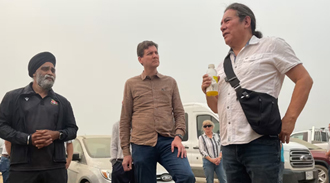
Tuesday August 22, 2023 | VICTORIA, BC [Updated at 3 pm on August 23, 2023]
by Mary P Brooke | Island Social Trends
Today BC Premier David Eby was in the Okanagan area to witness the wildfire impacts there firsthand.
He was accompanied by Minister for Emergency Management and Climate Readiness Bowinn Ma and Forest Minister Bruce Ralston.
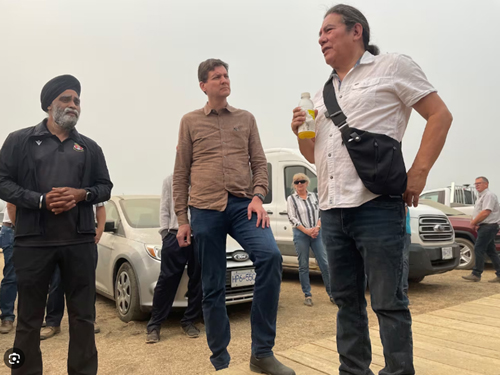
“This wildfire season is the worst in BC’s history. However, when times get tough, British Columbians come together,” said Premier Eby.
Eby posted later on Twitter (X): “The ways in which neighbours are coming together to care for one another is amazing. My gratitude goes out to local governments and First Nations, firefighters and emergency personnel, as well as the volunteers and community members for all their work to keep everyone safe.”
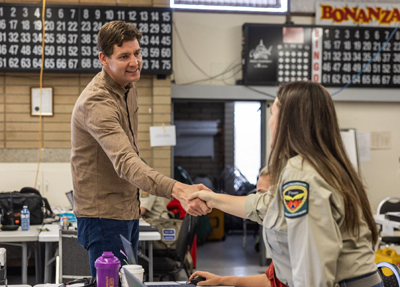
Eby, Ma and Ralston were accompanied on their wildfire visit by federal Emergency Preparedness Minister Harjit Sajjan. It was a long day of travel and many aspects of politics, people, fire service, and community.
TV footage this morning showed the four of them getting off a small aircraft together in Kamloops, where they were to meet with Tk’emlups te Secwepemc leadership and evacuees.
By noon they were to have headed for Salmon Arm to visit the Columbia Shuswap Regional District Operation Centre & Reception Centre and to meet with volunteers, but the smoky sky conditions were reportedly not safe for travel.
At 2:30 pm they were to arrive in Kelowna to visit the Incident Command Post and meet with fire chiefs and crews. Media availability was held at 4 pm in West Kelowna. At 5:30 pm the itinerary has them heading for Penticton to meet with evacuees City of Penticton Emergency Support Services.
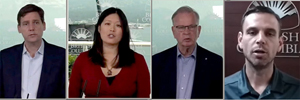

Travel restrictions worked:
BC’s team probably heard updates as to the effectiveness of the emergency order that was put in place on August 19 which has now “had the effect we required and thousands of hotel rooms were made available for people forced from their homes, as well as the many firefighters and emergency crews who are protecting us during the worst wildfire season in our history,” said Minister Ma in a news release at 4:40 pm today.
Travel restrictions will be lifted starting tomorrow (August 23) for most of the southern interior, with the exception of West Kelowna. The areas where the restrictions are lifted are: Kelowna, Kamloops, Oliver, Osoyoos, Penticton and Vernon.
Province urges people to consult with local communities before travelling to them, even without the ban, to make sure they are accepting visitors.
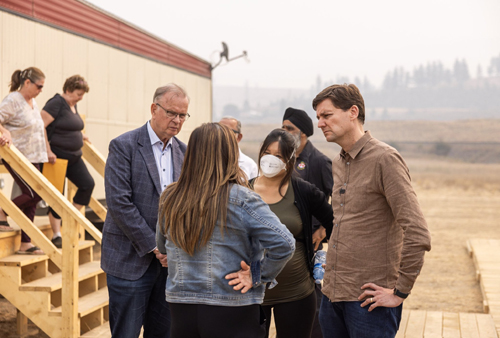
Commitment to the job:
Minister Ma is progressing with her pregnancy and as she deplaned this morning was seen wearing a face mask for the wildfire smoke.
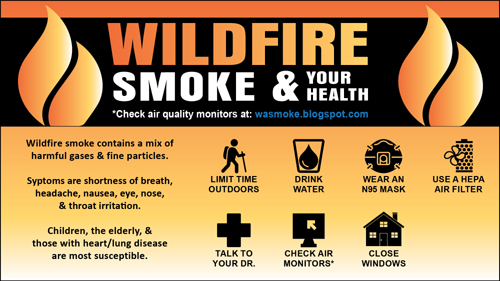
Federal NDP in the mix:
Tomorrow in Burnaby, federal NDP leader Jagmeet Singh will meet with Premier Eby and Minister Ma “to discuss the federal assistance that British Columbians need as wildfires rage across the province”.
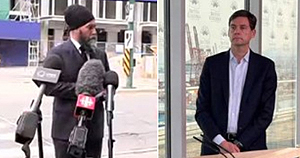
The federal NDP are of course still in a Supply and Confidence Agreement with the Liberal minority government.
August 23 update: Singh told media today that Canada is in need of “a better national focus on emergency teams”. He said that international firefighters are appreciated, but “we are not able to respond on our own”.
A Canadian national firefighting force would be equipped, trained and ready to be deployed — to catch fires early and respond quickly, and manage the evacuation of thousands of people or deal with a national crisis “on the spot”. That would be instead of “building a team at the last moment”.
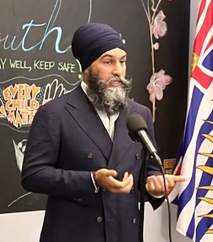
It would be ready year-round, a firefighting team around the country, said Singh. “It seems like there’s a crisis around the country year-round. To catch things early would be the right thing to do,” he told media today.
The federal NDP leader added that the provinces are not in the best position to secure resources (such as fire retardant gel and water bombers). that the federal government is better positioned to make those procurements.
Federal supports already in place:
Back in mid-July, the federal government had already acknowledged that BC was experiencing a challenging wildfire season and that the province had deployed all available provincial and local resources to respond to fires across the province.
By mid August, it was apparent that this is ‘the worst wildfire season in BC’s history’, according to Cliff Chapman, Director of Provincial Operations, BC Wildfire Service, this week.
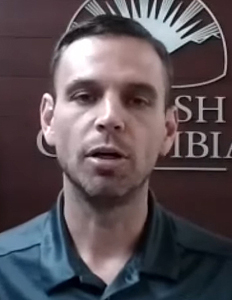
On July 16, then federal Minister of Emergency Preparedness Bill Blair announced approval of BC’s request for federal assistance “to support their efforts to combat wildfires”. It was stated that the Government Operations Centre is working closely with federal and provincial partners to coordinate the federal assistance in response to the situation in British Columbia.
Recent adjustments have been made, such as moving out soldiers from wildfire camps so that residential evacuees would have a place to stay.
In July, then-Minister of National Defence, Anita Anand, authorized the Canadian Armed Forces (CAF) to provide:
- personnel and resources to assist and enable fire fighting;
- airlift resources for mobility and logistical tasks, including the evacuation of isolated communities; and
- planning and coordination support.
- In addition to the CAF deployment, the federal government is also providing the following supports:
- The Canadian Coast Guard is providing:
- Personnel to support the management, operations and administrative activities of BC Wildfire Service’s Incident Command Posts
- a maritime staging facility for fire fighting equipment and personnel, and,
- two helicopters to transport firefighters and equipment to remote locations.
- The Canadian Coast Guard will also provide support and assistance to remote coastal communities, in the event that access to those communities becomes restricted.
- Indigenous Services Canada (ISC) provides funding for preparedness, mitigation, response and recovery through the Emergency Management Assistance Program (EMAP) to enhance capacity to address emergency events including wildfire. ISC is working closely with the Province of British Columbia, First Nations’ Emergency Services Society of British Columbia and the First Nations Health Authority to ensure First Nations are fully supported to respond to emergency events and evacuations. ISC keeps in close contact with affected First Nations to ensure they are fully supported during emergency events and evacuations.
“Transport Canada, Parks Canada, Public Services and Procurement Canada, and the Royal Canadian Mounted Police are standing by to provide assistance to address additional needs under their own mandates, as needed,” it was stated in a federal news release on July 16.
===== RELATED:
BC Wildfire update Aug 21 after a smoky air weekend (August 21, 2023)
Smoky Sunday skies in the west shore (August 20, 2023)
Smoky skies & health reminders (August 19, 2023)
Additional state of emergency to assure accommodations during wildfire evacuations (August 19, 2023)
State of Emergency called due to wildfire (August 18, 2023)
BC preparing for extreme fire conditions & accepting NWT evacuees (August 17, 2023)



